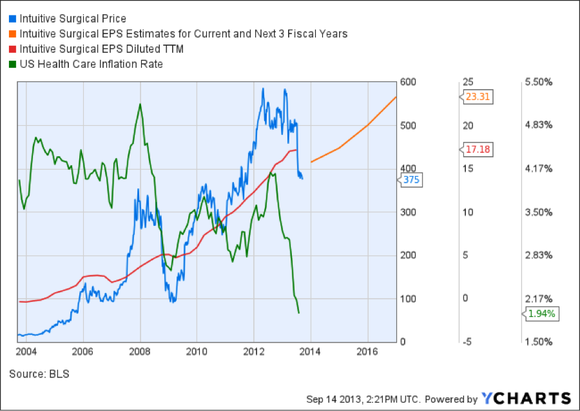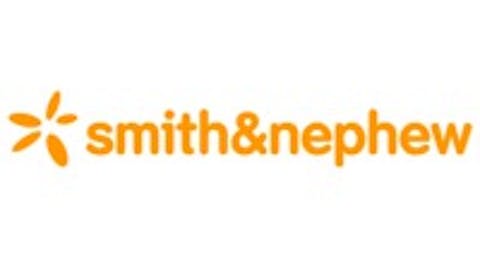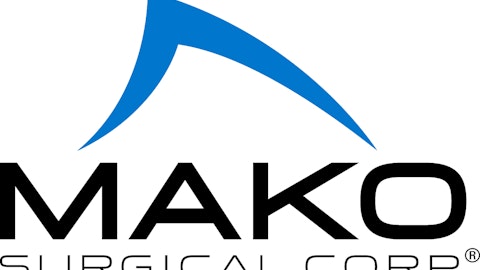When a small company is growing quickly, investors who get in on the ground floor can expect substantial capital appreciation. However, there is little that makes the market unhappier than when that period of hyper-growth ends. One example of this is Intuitive Surgical, Inc. (NASDAQ:ISRG), which has fallen sharply over the past several months due to slowing sales of the da Vinci surgical system.
The current investment climate
For the second quarter of 2013, Intuitive Surgical, Inc. (NASDAQ:ISRG) reported an 8% increase in sales from the same quarter in 2012 but a 5% decrease from the previous quarter. Earnings also came in lighter than expected at $3.90 per share, versus expectations of $4.04 per share. The chart below puts the situation in perspective with the red line tracking historical earnings per share and the yellow line representing the new projected earnings growth path. The market is now projecting no growth for at least the next few quarters and a 13% annual growth rate afterward. The historical 34% compounded annual growth rate that has been achieved over the past five years is expected to be gone for good.
Management has put money on the line, committing to repurchase $1.5 billion worth of shares, which corresponds to 10% of the company’s float. Intuitive Surgical, Inc. (NASDAQ:ISRG) has no debt and sufficient cash on hand to fund the buyback.

The most substantial headwind for Intuitive Surgical, Inc. (NASDAQ:ISRG) is the slowing rate of heath care inflation, as shown above. Hospitals have been more reluctant to install new systems and insurers have aggressively fought to reduce heath care costs recently. It is important to note that 57% of revenues for the prior fiscal year are recurring and would be expected to continue without installation of new surgical systems. In order to operate the da Vinci system, a hospital must sign an annual service agreement (15.7% of 2012 sales) and purchase instruments and accessories (41.4% of sales). While core system sales have been disappointing — falling from 175 in the fourth quarter of 2012 to 143 in the second quarter of 2013 — the effect on profitability has been buffered by recurring revenue.
Longer-term investment considerations
The primary question to ask yourself before making an investment is whether minimally invasive surgical procedures will lead to better patient outcomes. If robotic surgery improves success rates and lowers hospitalization time then implementation is sure to continue. There is ample clinical evidence to support this case as evidenced by hundreds of peer reviewed publications and several recent clinical studies that are summarized in more detail in Intuitive Surgical, Inc. (NASDAQ:ISRG)’s most recent 10-K filing.
Although there has been sluggishness on the part of hospitals to purchase new units, the number of procedures performed on the da Vinci has continued to grow at an 18% year-over-year rate. This indicates that hospitals are reluctant to spend and are better utilizing already existing capacity. If procedure growth continues, however, this trend cannot last indefinitely. Furthermore, 1,957 hospitals have installed the da Vinci system out of more than 5,000 hospitals in the U.S. and many more abroad, leaving ample room for future growth.

Source: Intuitive Surgical Q2 2013 investor presentation.
Comps
While Intuitive Surgical is unique, it is worthwhile to compare it with other more established sellers of medical devices. Stryker Corporation (NYSE:SYK) is a manufacturer of reconstructive products (44% of 2012 sales) and medical and surgical equipment (38%.) The company is a good example of an established purveyor of medical devices and is expected to grow earnings in the high single digits over the next several years. Zimmer Holdings, Inc. (NYSE:ZMH) is a similar company with more emphasis on reconstructive implants (74% of 2012 sales). Again, high single digit earnings growth is expected.




